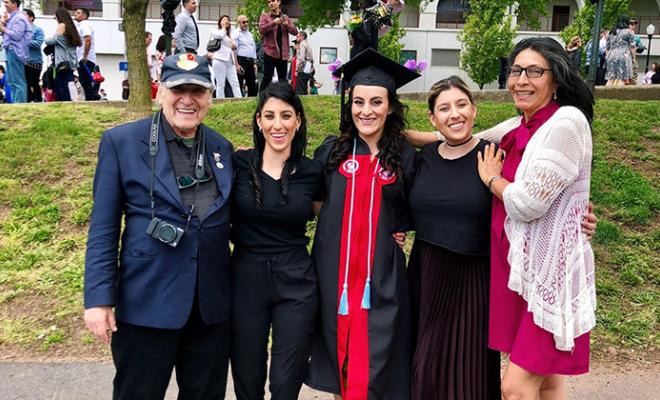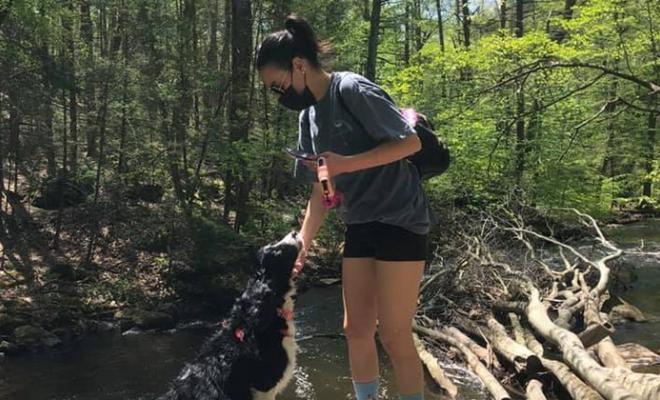“You describe it feels like you’re drowning, and I am handing you a life vest. But you’re reluctant or declining to take the life vest I am throwing at you, so it really is up to you.”
This is the metaphor that describes my most recent appointment with my lung transplant doctor. It felt like they were holding up a mirror, a mirror I have been avoiding. In today’s world, transplant has been seen in a positive light. It's been painted as a golden child of medical procedures — a savior for some and a long-term Band-Aid for others, such as cystic fibrosis patients. What is not vocalized enough, though, is the mental preparation and acceptance it takes to make that life-or-death jump and say, “yes, I am ready for transplant despite the risks.” I am not here to put on a face of “bravery” that is often bestowed onto CF patients like myself. Quite honestly, I don’t feel brave in any aspect when it comes to making decisions for my health.
Decisions that were once just a simple routine are now met with tear-filled anxiety, sweaty palms, “doomsday” thinking, and a feeling of never-ending obligation. The obligation consists of self-admissions to the hospital, taking a cocktail of potent antibiotics, and sluggishly putting on my airway clearance vest to give my body tough love. Not to mention my second battle with CF-related diabetes, but that's for another story time. They say repetition makes things easier, and when you carry out the same routine your whole life, you expect things to change. However, for some of us, the results only worsen over time with no new solutions. And when one is faced with a life-altering option like transplant, you start to question your own resiliency.
In April 2024, I started to experience decline in lung function almost overnight, and my ability to fight off infections slowed down. My FEV1 (lung function) had dropped to the lowest point at 22%, and I weighed only 82 lbs. I kept this private, for I didn’t want to be seen as the boy who cried wolf. But everyone close to me could tell this was serious. For many people, losing weight is a dream, but for me, this was a living nightmare. Every part of my body ached and cracked. My lungs felt like stiff leather that pulled every time I breathed, and my blood glucose was out of control.
I called myself “the wet sponge” in the hospital because my body would just sweat out all the IV meds, and anytime I coughed or even napped, I was drenched like I had run a marathon. It was then that I thought to myself, This cannot get any worse. Will I bounce back? Is this what it feels like to be at the end of my rope?
This hospitalization brought up the dreaded discussion to explore my transplant options at NYU Langone, a place I had avoided for two years since an initial appointment. Fast forward to Nov. 11, 2024, when I met once again with the transplant doctor. I knew this appointment would be met with emotions and my own pushback, reservations, and questions. Transplant seems like a no-brainer for able-bodied people, even to some medical professionals; but to me, it feels like a temporary solution. I am so blessed to have made it past my life expectancy, but as a 30-year-old trying to navigate the world as it is now, I want nothing to do with cystic fibrosis any longer.
Transplant does not mean a cure. It does not take away my pancreatic insufficiency, which means I will still have to take enzymes during meals. My diabetes, which was caused by CF, will still need to be controlled with an insulin pump. And, of course, the freedom I so wish to have with no strings attached will not be a reality.
Living post-transplant is considered “trading for a different lifestyle,” and frankly I’m over it. As part of the last small group of patients who are not eligible for any modulators — who has tried Trikafta and showed no improvement — transplant is indeed my only option, which makes me feel that I am on borrowed time.
I went from thinking about transplant within the next five years in April, to now trying to make this decision within the next year to be considered eligible. I don’t expect anyone to understand this, I can’t even grasp this myself. There is no manual for this cruel, chaotic CF life.
There's a lot of things I haven’t accomplished yet and that should be my motivation. I deserve to take a chance on myself, but haven’t I my whole life? All this self-discipline has led me to this point, but unfortunately it doesn’t take away from the pure fear and loneliness that comes with this progressive disease. Since I am part of such a rare, small group within the CF community, I often see people with CF in three groups — people thriving on modulators, people living post-transplant, and my small, rare group all pushing through the muddy waters. We are all exhausted.
As I wrap this up, you may be wondering where I stand with transplant. To be honest, I am still unsure. I fear the healing process — healing is difficult. Healing has felt like survival mode since the pandemic. However, I know that I legit don’t have more time to sit on this decision and just hope for something. The reality is, it's not coming in time — a breakthrough drug, a genetic therapy, none of this will happen for me in my timeline. I’m confident I will make the right decision whenever I cross that bridge. I am taking it all one breath at a time. Thank you for hearing my life's truth.
Interested in sharing your story? The CF Community Blog wants to hear from you.





